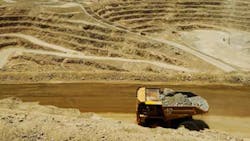Glencore Rebounds After a Day of Stock Market Dread
ZURICH—Shares in mining giant Glencore rebounded Tuesday after the company assured markets its business remained robust, following rumors in financial circles it might soon be de-listed.
The debt-laden Swiss company, which has been hard-hit by a commodity price collapse as China's economic boom slows and its demand for raw materials declines, insisted its business was "operationally and financially robust."
"We have positive cash flow, good liquidity and absolutely no solvency issues," it said in a statement.
The announcement appeared to reassure investors: Glencore's share price surged as much as 20% in London trading before closing up 16.95%, recovering a good part of the 29% loss it suffered Monday.
By the end of the day Monday, Glencore had lost more than three quarters of its value since listing with much fanfare in London and Hong Kong in May 2011.
Analysts warned that Glencore's massive losses Monday were not justified, with several suggesting the mining giant should delist to shield itself from the abuse.
"The pummeling of Glencore yesterday was irrational," Societe General analyst Robin Bhar told Bloomberg News.
CitiGroup meanwhile said in a note that if the stock market did not stop massacring Glencore's shares, company chief Ivan Glasenberg, who holds 15.8% of the company, should consider going private.
"The markets response is overdone ... In the event the equity market continues to express its unwillingness to value the business fairly, the company management should take the company private, whereby restructuring measures can be taken easily and quickly." said the bank, which helped Glencore to go public in 2011.
Most resources-linked firms have taken a hit in recent months as the price of copper, aluminium, iron ore and oil have dropped to multi-year lows.
$30 Billion in Debt
But Glencore has been particularly badly affected because of its huge $30 billion debt-load.
Dealers were further spooked on Monday when brokerage Investec said in a research note to clients: "The challenging environment for mining companies leads us to the question of how much value will be left for equity holders if commodity prices do not improve," adding that Glencore's equity value "could evaporate".
But on Tuesday, Glencore stressed that it had already taken a number of "proactive steps to position our company to withstand current commodity market conditions."
The Swiss mining goliath said it was making progress on a range of drastic moves announced at the beginning of the month aimed to cut its $30-billion debt by a third.
Among other measures, the company has raised $2.5 billion in share sales, has halted dividend payments until further notice and has suspended production at its Katanga copper and cobalt mine in the Democratic Republic of Congo.
"Glencore has no debt covenants and continues to retain strong lines of credit and secure access to funding thanks to long term relationships we have with the banks," it said in Tuesday's statement.
"We remain focused on running efficient, low cost and safe operations and are confident the medium and long-term fundamentals of the commodities we produce and market remain strong into the future," it added.
Glencore, which was founded in 1974 by the late Marc Rich, a trader who made it onto the FBI's 10 most wanted list in part for trading oil with Iran, moved into the big leagues in 2012 when it launched a takeover offer for Swiss miner Xstrata.
The resulting merger created a $90 billion group and a new powerhouse in the global commodities industry, which boasted more than 180,000 employees and contractors around the world in 2014.
The new Glencore Xstrata shares listed in London in May 2013 at 343 pence a share. On Tuesday they closed at 80 pence.
Copyright Agence France-Presse, 2015
About the Author
Agence France-Presse
Copyright Agence France-Presse, 2002-2025. AFP text, photos, graphics and logos shall not be reproduced, published, broadcast, rewritten for broadcast or publication or redistributed directly or indirectly in any medium. AFP shall not be held liable for any delays, inaccuracies, errors or omissions in any AFP content, or for any actions taken in consequence.
